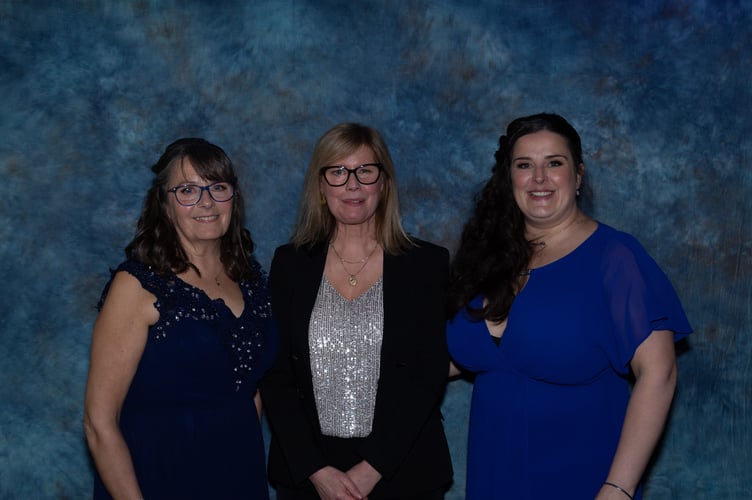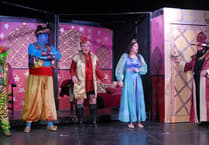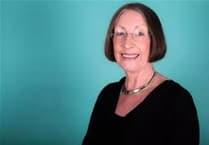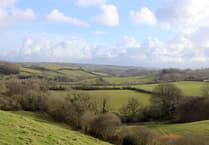ONE of Cornwall’s biggest fundraising events is back in Liskeard this weekend as it hopes to bring in thousands of pounds for Cancer Research UK.
Relay for Life at Lux Park will begin at noon on Saturday and will see teams taking it in turns to run, jog, or walk around the rugby pitch track for a full 24 hours.
The event starts with a Survivors’ lap, where anyone who’s come through the illness is invited to walk the first steps together in purple T-shirts. Dedicated fundraisers then keep going, taking part in fun fancy dress laps, themed to raise awareness of different types of cancer.
As relayers test their stamina on the track, supporters can enjoy a full day of entertainment until 10pm, and it all continues on the Sunday morning from 9am.
There’ll be carnival games, face-painting, craft and plant stalls, demonstrations by local clubs and live music as well as food and drink on the field.
Opening the line-up is Luke Middleton, whose Relay for Life Liskeard song has travelled far and wide in the UK and beyond. A recent recording of the song featuring the Keltique Ladies and Pelynt Male Voice Choirs can now be found on YouTube by searching for ‘Relay for Life 2023 (Live Recording)’.
At 10pm on the Saturday, a Candle of Hope ceremony is a time to remember loved ones we’ve lost and reach out in solidarity to anyone going through a cancer diagnosis and treatment. Paper bags, weighted with sand, are decorated with messages and light up around the track after darkness falls.
While this weekend’s Relay for Life event is the main focus, fundraising by teams and supporters has been going on throughout the year. The Quilt of Hope Cornwall team were at Liskeard’s Coronation Picnic in the Park recently with their crafts and jewellery including Hearts of Hope brooches and earrings, and if you’ve missed them before, they’ll be at Lux Park this weekend.
Meanwhile, a ‘Bluebell Ball’ organised by Joy Parker and Vicky Parker-George in memory of Geoff Parker has brought in an incredible £6057 toward this year’s total.
Chair of the local Relay committee Carrie Richards is encouraging everyone to come up to the event at Lux Park this weekend. “We are so excited to be at Liskeard Rugby Field again this year, where the whole local community can come together to help beat cancer.
“We have got lots going on over the weekend, with great local music, a variety of stalls to look around, light refreshment and lots of games and activities for all ages. The event is free and everyone is welcome, so please come along and enjoy our family fun day whilst supporting this fantastic charity. We look forward to seeing you there.”
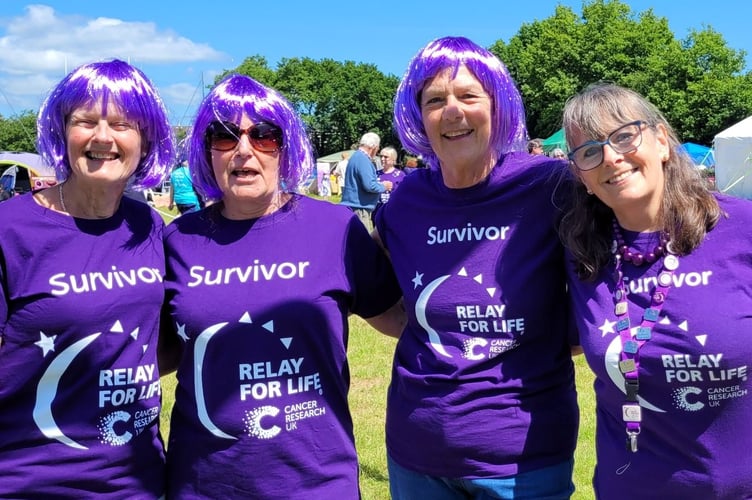
Third generation cancer patient explains why she is joining relay
WHEN she heard the words ‘you have cancer, in both breasts,’ it was a shock, but not a surprise for Bernie Cole.
“I’m third generation. Mum died of breast cancer when I was seven, and I never knew my Grandma, because she died when my mum was younger.”
Bernie partied hard when she reached her 40th birthday – her mother had been just 38 years old when she died.
“To find out three years later that I had cancer… I think actually if they’d told me it wasn’t that, I would have been more surprised. The consultant shook my hand, but he gave Darren, my husband, a big hug. He could see how hard he was taking it.”
Bernie had found a lump that felt like a little grape four weeks previously. “I’d been a little bit tired, but with a busy life you have days where you feel tired. There was nothing else that screamed out something wrong.”
Once referred to Derriford, there’s a commitment to begin investigations within two weeks.
After the diagnosis, life for Bernie and her family “just went crazy” as they were funnelled quickly into a process of treatment, surgery, and decisions that had to be made.
“Because of my family history, they advised me to have a double mastectomy, and I opted for that. After some deliberation, I chose to have implants at the same time.”
With implants, surgeons are able to keep the skin and external features. It can be a good option for many women. But while one of Bernie’s implants settled, the other just would not heal well, and after weeks of varying attempts to save it, the implant had to be removed due to sepsis. A silicon pouch, designed to be filled with saline and pumped to fill the space, was plan B. However, with chemotherapy set to start, she needed to be as healthy as possible, and the left side needed to heal. Bernie was left “with the skin there but nothing in it”, just as the country went into lockdown. The ‘expander’ was finally inserted in August 2020. Then there were more trips to Derriford to have it pumped up gradually.
In the meantime, she’d undergone seven rounds of chemotherapy, with the eighth and last carried out in Liskeard.
“The Primrose Centre and Oncology Department in Derriford are absolutely amazing. I can’t say enough how fantastic they were,” she says, paying tribute to her specialist breast cancer nurse Su, “a superhero” – and her surgeon, with his eccentric ways, straight talking and sense of humour.
But there are still things the doctors don’t tell you – “like the way some chemotherapy turns your wee orange, and how very painful it is when you lose your hair.
“Once I knew I was having chemo, I had my hair cropped. Then when it started coming out in clumps, I got my friend to shave it all off. It is heartbreaking to see your hair come out like that when you run your fingers through it. But it also really, really hurts your scalp, afterwards. I think it must be the follicles dying.”
In the August of 2019, on her dad’s birthday, Bernie had heard that her lymph nodes were clear – the best news either could have wanted.
After chemotherapy to kill any floaters that were in her body, she was considered cancer-free. But Covid brought long delays, and it would be May 2022 before her final implant surgery could happen.
“You go through lots of mental battles about that. Part of you says, ‘What am I thinking, I’m alive, it doesn’t matter what shape I am,’ and nobody really notices your wonky boobs, it’s all what’s in your own head – but actually, it does matter.”
Bernie went for testing that showed she carries the brca 2 gene: this can be passed down to children and also confirmed that her cancer was hormone-fed. Her two sons (“I did a little dance when I found I was having boys”) will be able to choose to have gene testing when they reach 18. Men, too, can develop breast cancer, although it occurs much less frequently.
Bernie has also chosen to have her ovaries removed due to an increased risk of ovarian cancer, and the hormone-inhibiting medicines that she will take daily for a further six years come with side effects.
“It makes you feel like an old lady. I didn’t realise how your hormones help your joints and everything move and flow.
“During the treatment my breast care nurse told me that it would be afterwards that would be the hardest part to deal with. I didn’t really believe her. But now I am out the other side and I’m recovering, I realise, I don’t think you give yourself enough time to grieve when it’s all happening. Who you were before is not necessarily very different but there are bits of you – literally – that you’ve left behind. Your outlook changes.
“It’s not just the fact that I’ve had my boobs removed and it was all a bit of a horrible time, but also I went full cold turkey into menopause. My body looks a lot different. You lose a lot of confidence about who you are, because you’ve changed.
“Menopause is huge and a lot of women don’t talk about it. A lot of the things I’d put down to my cancer and surgery were actually that. It’s not just oh you’re having a hot flush and you’ll be alright once you’ve had a cup of tea. But I’m going to get some support..and I’ll start to love the new me, whatever shape that is.”
The network of friends and family and wider community is what Bernie says got her through it all, from her closest relatives taking over day-to-day running around and tasks, to kind texts and visits over the garden gate with the weekly shopping, and the corner shop staff offering to run a pint of milk over to the house.
Liskeard still has that strong element of community, she says, and it really comes across at events like the Relay for Life.
“Cancer brings a real emotional rollercoaster. So when you see someone with no hair, or all those survivors at Relay in purple T-shirts, you know that every single one of them, and their families, have been on a massive journey.”
Bernie wants people not to be afraid to talk about cancer, and to get themselves checked quickly if they find a lump, or if something doesn’t feel right.
“It might be nothing, but an early diagnosis can mean the difference between living and dying.
“I’ve always supported Cancer Research and the Relay in Liskeard because of my mum. “All this money that we try and raise, it could benefit any of us. It’s not just that it could save a life, it could save a family.”
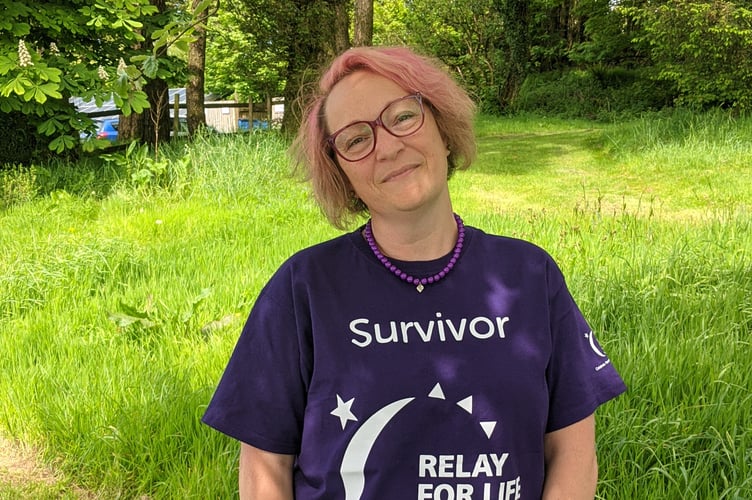
Meet the team
PICTURED below (l and r) are Joy Parker and Vicky Parker-George with divisional senior manager for Cancer Research UK Sam Williams.
Joy and Vicky hosted a Bluebell Ball at Sunnyside, their family home in memory of Geoff Parker, raising more than £6,000. Until his untimely death in 2018 from a rare and aggressive cancer, Geoff, a local farmer and founder member of the Parkers’ Pink Ladies team, had always worked tirelessly behind the scenes at Relay since its origin in 2008.
On the evening, 139 guests enjoyed a sit down dinner in the Green Shed at Sunnyside, the home of the Parker family. MC Ian Maddever introduced a game of Heads and Tails, the raffle, and an aution of donated items. Joy said: “It was so encouraging to hear Sam speak of the latest breakthroughs in research and to learn that Cancer Research UK are currently supporting around 30 clinical trials in Cornwall which patients can access through Derriford and Treliske Hospitals.”
